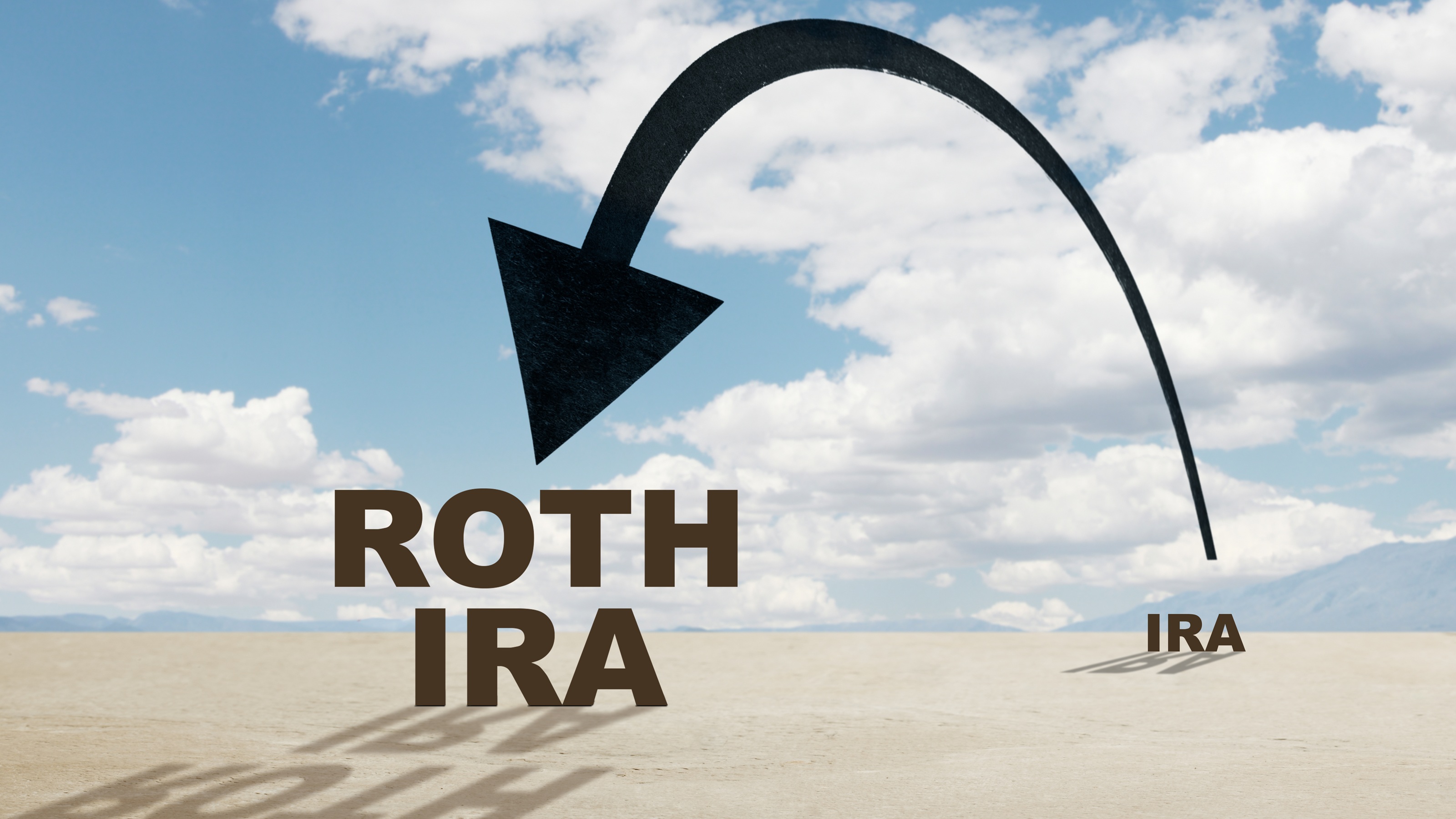Ready to Retire? It's Not Too Late to Convert to a Roth IRA
Millions of Americans are turning 65 this year. If you're retiring soon, don't dismiss the idea of a Roth conversion — it could still be a smart move even now.


Profit and prosper with the best of Kiplinger's advice on investing, taxes, retirement, personal finance and much more. Delivered daily. Enter your email in the box and click Sign Me Up.
You are now subscribed
Your newsletter sign-up was successful
Want to add more newsletters?

Delivered daily
Kiplinger Today
Profit and prosper with the best of Kiplinger's advice on investing, taxes, retirement, personal finance and much more delivered daily. Smart money moves start here.

Sent five days a week
Kiplinger A Step Ahead
Get practical help to make better financial decisions in your everyday life, from spending to savings on top deals.

Delivered daily
Kiplinger Closing Bell
Get today's biggest financial and investing headlines delivered to your inbox every day the U.S. stock market is open.

Sent twice a week
Kiplinger Adviser Intel
Financial pros across the country share best practices and fresh tactics to preserve and grow your wealth.

Delivered weekly
Kiplinger Tax Tips
Trim your federal and state tax bills with practical tax-planning and tax-cutting strategies.

Sent twice a week
Kiplinger Retirement Tips
Your twice-a-week guide to planning and enjoying a financially secure and richly rewarding retirement

Sent bimonthly.
Kiplinger Adviser Angle
Insights for advisers, wealth managers and other financial professionals.

Sent twice a week
Kiplinger Investing Weekly
Your twice-a-week roundup of promising stocks, funds, companies and industries you should consider, ones you should avoid, and why.

Sent weekly for six weeks
Kiplinger Invest for Retirement
Your step-by-step six-part series on how to invest for retirement, from devising a successful strategy to exactly which investments to choose.
In 2025, a record 4.18 million Americans will turn 65. For those planning to retire soon, an important question arises: Does converting retirement savings from a tax-deferred account to a Roth IRA make sense — or is it too late?
Before making a decision, it's important to consider the pros and cons of a Roth conversion. A starting point is understanding what a Roth IRA is and how a conversion impacts your tax liability, both in the short and long term.
A Roth IRA is a retirement account to which you contribute after-tax dollars. When you convert pre-taxed or tax-deferred accounts — such as a 401(k), a traditional IRA, a SEP or a simple IRA — to a Roth IRA, you pay income tax on the amount converted in the years you're making the transfers.
From just $107.88 $24.99 for Kiplinger Personal Finance
Become a smarter, better informed investor. Subscribe from just $107.88 $24.99, plus get up to 4 Special Issues

Sign up for Kiplinger’s Free Newsletters
Profit and prosper with the best of expert advice on investing, taxes, retirement, personal finance and more - straight to your e-mail.
Profit and prosper with the best of expert advice - straight to your e-mail.
The Kiplinger Building Wealth program handpicks financial advisers and business owners from around the world to share retirement, estate planning and tax strategies to preserve and grow your wealth. These experts, who never pay for inclusion on the site, include professional wealth managers, fiduciary financial planners, CPAs and lawyers. Most of them have certifications including CFP®, ChFC®, IAR, AIF®, CDFA® and more, and their stellar records can be checked through the SEC or FINRA.
The upside is that Roth IRA distributions are tax-free, as long as you're over 59½ years of age when you make the withdrawals, and your Roth IRA has been open at least five years. In contrast, any withdrawals from tax-deferred retirement accounts are taxed.
Here's one note on the five-year rule for Roth IRAs: It's never too late to make a Roth conversion. Some people assume they have to own the account at least five years before withdrawing money from it.
But what some people don't know is that the five-year rule is based just on the interest earned on the account.
In other words, you can take out your principal (your contributions) from a Roth IRA without penalty within the first five years of having the account.
However, withdrawals of earnings within that first five years are subject to income tax and a 10% penalty if you haven't reached age 59½ upon withdrawal.
Another timing aspect with Roths: Even if you opened a Roth 20 years ago, funded it once and it just sat there, the timeline started when it was opened. The clock doesn't start over if you delay contributing to your Roth for a few years.
The upsides of a Roth conversion
Besides tax-free withdrawals, the pros of a Roth conversion and having a Roth IRA are:
No required minimum distributions. Those with tax-deferred accounts must take RMDs after they turn 73. RMDs add to a retiree's tax burden.
However, with a Roth, retirees aren't forced to withdraw a certain amount calculated by the IRS, whether they need the money or not. This eliminates a potential tax bomb in the future.
Possibly lower taxes in retirement. Converting to a Roth well before retirement can save you significant money down the road. It may also help put you in a lower tax bracket in retirement than you would have been with the addition of RMDs.
Roth IRAs are prudent if you expect your marginal tax rate will be higher in retirement than during your working years.
The downsides of a Roth conversion
Along with the possibility of substantial taxes on Roth conversions in the years you make them, consider these cons:
Potentially higher tax bracket. The amount of money you convert to a Roth from a tax-deferred account could push you into a higher tax bracket.
That's why it's important to strategize with your financial planner about how much to convert each year and over several years.
Increased Medicare premiums. Higher income resulting from a Roth conversion can increase your Medicare premiums. A multiyear process for conversion can help prevent higher Medicare premiums.
Tax-free growth in a retirement account is a great opportunity, but deciding whether to do a Roth conversion depends on your income and related year-to-year tax situation.
For example, retirees who have not yet started drawing Social Security might be in a good position to consider Roth conversions.
Looking for expert tips to grow and preserve your wealth? Sign up for Building Wealth, our free, twice-weekly newsletter.
Committing to a multiyear conversion process often makes sense for many people with plenty of working years left. That approach lessens the added yearly tax burden caused by conversions and solidly prepares them for a retirement strengthened by tax-free withdrawals.
It's important to remember this: The converted funds in a Roth may take years before showing gains that put you in a better position than if you had stayed exclusively with a tax-deferred account.
Contributions or conversions? The key differences
Pay attention to the difference in parameters between Roth contributions and conversions. There is no limit to how much you can convert to a Roth IRA in a single year, but it's a good idea to spread the conversions over several years for tax purposes in those years.
However, the IRS limits how much can be contributed annually to any type of IRA, adjusting the amounts periodically.
- Single tax filers cannot contribute to a Roth IRA if their modified adjusted gross income (MAGI) is more than $165,000 in 2025, while for married couples filing jointly, the MAGI limit is $246,000 in 2025.
- The 2025 contribution limit for Roth IRAs is $7,000 for those younger than 50, with catch-up contributions of $1,000 allowed for those aged 50 and up.
Is converting now the right move?
Tax rates are at historic lows, but they are likely to go up in the future. For some people who are currently converting to Roth, their thought process is that they're going to be in a higher bracket down the road, so converting now makes sense.
In the long run, they can benefit significantly from the earnings on the amount converted.
Let's say someone in the 22% tax bracket converts to a Roth now. Then in retirement, with their Social Security, perhaps a pension and other funds, their tax rate increases.
Back when they did a Roth conversion, they paid 22% on, for example, a $10,000 conversion that over the years grew to $100,000 tax-free in their Roth account. They will owe no tax on that $100,000 when they take it out, which, to a degree, mitigates being in a higher tax bracket in retirement.
Why don't more people use Roth conversions? It's about weighing near-term convenience at the expense of possible tax pain in retirement.
The issue is that many CPAs, looking to get rehired every year by reducing their clients' tax burden as much as possible, advise clients to put money into their regular IRA or other tax-deferred accounts.
The bottom line with Roth conversions is that the sooner you do them, the more likely they will benefit you in a big way in retirement.
It's never too late, but as you get closer to retirement, the thought of supporting those hard-earned years with a good chunk of tax-free money looks better and better.
Dan Dunkin contributed to this article.
The appearances in Kiplinger were obtained through a PR program. The columnist received assistance from a public relations firm in preparing this piece for submission to Kiplinger.com. Kiplinger was not compensated in any way.
The views and opinions expressed are for educational purposes only and are not intended to be a recommendation or investment advice. Any guarantees offered by an annuity are backed by the financial strength and claims-paying ability of the issuing insurance company. Centaurus Financial, Inc and Cornell Asset Management are not affiliated companies.
Securities and advisory services offered through Centaurus Financial Inc., member FINRA/SIPC, a registered investment advisor. This is not an offer to sell securities, which may be done only after proper delivery of a prospectus and client suitability is reviewed and determined. Information relating to securities is intended for use by individuals residing in FL, NC, SC, GA, MA, NH, NJ, NY, OH, PA, RI, VA, WI, AR, CA, IL, KY.
Related Content
- The Roth IRA Advantage: 10 Things Every Saver Needs to Understand
- 10 Reasons to Leave Your Heirs a Roth IRA
- Five Roth IRA Pitfalls Your Adviser May Not Tell You About
- Should You Convert a Traditional 401(k) into a Roth 401(k)?
- Little-Known Ways to Guard Your Retirement Income
Profit and prosper with the best of Kiplinger's advice on investing, taxes, retirement, personal finance and much more. Delivered daily. Enter your email in the box and click Sign Me Up.

Jacob Cornell is a financial adviser at Cornell Asset Management. He’s a third-generation financial adviser whose father was vice president of Morgan Stanley in Sarasota, Fla. Cornell can offer investment and insurance products and services while helping people navigate their finances throughout retirement. He leads informational classes at the State College of Florida, Manatee-Sarasota, and Florida Southwestern State College.
-
 Quiz: Do You Know How to Avoid the "Medigap Trap?"
Quiz: Do You Know How to Avoid the "Medigap Trap?"Quiz Test your basic knowledge of the "Medigap Trap" in our quick quiz.
-
 5 Top Tax-Efficient Mutual Funds for Smarter Investing
5 Top Tax-Efficient Mutual Funds for Smarter InvestingMutual funds are many things, but "tax-friendly" usually isn't one of them. These are the exceptions.
-
 AI Sparks Existential Crisis for Software Stocks
AI Sparks Existential Crisis for Software StocksThe Kiplinger Letter Fears that SaaS subscription software could be rendered obsolete by artificial intelligence make investors jittery.
-
 Quiz: Do You Know How to Avoid the 'Medigap Trap?'
Quiz: Do You Know How to Avoid the 'Medigap Trap?'Quiz Test your basic knowledge of the "Medigap Trap" in our quick quiz.
-
 5 Top Tax-Efficient Mutual Funds for Smarter Investing
5 Top Tax-Efficient Mutual Funds for Smarter InvestingMutual funds are many things, but "tax-friendly" usually isn't one of them. These are the exceptions.
-
 Why Invest In Mutual Funds When ETFs Exist?
Why Invest In Mutual Funds When ETFs Exist?Exchange-traded funds are cheaper, more tax-efficient and more flexible. But don't put mutual funds out to pasture quite yet.
-
 We Retired at 62 With $6.1 Million. My Wife Wants to Make Large Donations, but I Want to Travel and Buy a Lake House.
We Retired at 62 With $6.1 Million. My Wife Wants to Make Large Donations, but I Want to Travel and Buy a Lake House.We are 62 and finally retired after decades of hard work. I see the lakehouse as an investment in our happiness.
-
 Social Security Break-Even Math Is Helpful, But Don't Let It Dictate When You'll File
Social Security Break-Even Math Is Helpful, But Don't Let It Dictate When You'll FileYour Social Security break-even age tells you how long you'd need to live for delaying to pay off, but shouldn't be the sole basis for deciding when to claim.
-
 I'm an Opportunity Zone Pro: This Is How to Deliver Roth-Like Tax-Free Growth (Without Contribution Limits)
I'm an Opportunity Zone Pro: This Is How to Deliver Roth-Like Tax-Free Growth (Without Contribution Limits)Investors who combine Roth IRAs, the gold standard of tax-free savings, with qualified opportunity funds could enjoy decades of tax-free growth.
-
 One of the Most Powerful Wealth-Building Moves a Woman Can Make: A Midcareer Pivot
One of the Most Powerful Wealth-Building Moves a Woman Can Make: A Midcareer PivotIf it feels like you can't sustain what you're doing for the next 20 years, it's time for an honest look at what's draining you and what energizes you.
-
 Stocks Make More Big Up and Down Moves: Stock Market Today
Stocks Make More Big Up and Down Moves: Stock Market TodayThe impact of revolutionary technology has replaced world-changing trade policy as the major variable for markets, with mixed results for sectors and stocks.